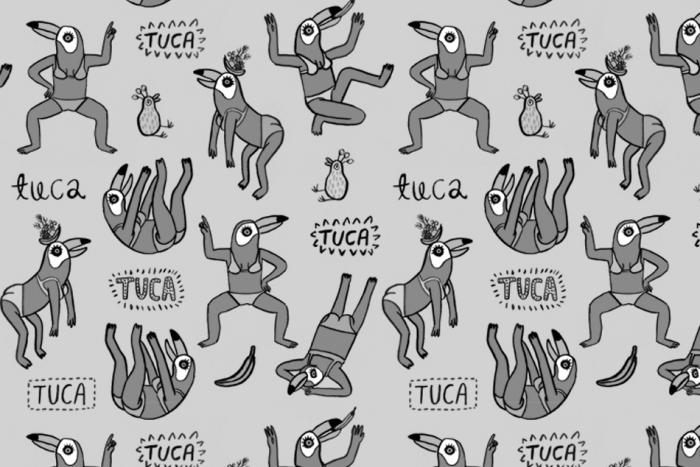In Conversation with Douglas Coupland
Thursday, October 31, 2013
Bert Archer , Douglas Coupland
My date and I sit right at the front, about a foot from the stage, then I realize I have sat in the front row for every IFOA event I’ve attended this year. I consider moving to the back or middle, to change up my perspective, but then it feels a little too late.
Soon, Bert Archer comes onstage to introduce Douglas Coupland, here to promote his new book, Worst. Person. Ever. Later he’ll answer in the affirmative when Archer asks if the title is meant to be said in the voice of the Comic Book Guy from The Simpsons. But first, interviewer and subject pick up a thread dropped during some offstage banter: “I hear you’re celebrating an anniversary today,” Archer says. Coupland nods. It’s been exactly 25 years since he quit smoking. “I dream about it once a week,” he says. “God, I miss it so much.” He asks the audience how many of us are smokers. I raise my hand. “Oh, not too many of you left,” Coupland says. I swivel my head and see only one other hand, way in the very back.
Coupland is known for giving convention a gentle flouting, and he explains to us that he won’t be reading from his new book. Worst. Person. Ever. has a English narrator and Coupland says he is incapable of reading in anything but his own voice. Instead, the lights go down and the room hears a selection from the audio book. It’s not a disaster, but it’s not a great idea either. Sitting in the dark experiencing some Brit narrate Coupland’s work—this particular section features two characters discussing the best practices for fucking sheep—we get torn out of the action on stage. It’s hard to listen to much but the sound of people’s breath slowing down, or the sound of at least one person leaving before the lights come back on.
After some talk and then a second “reading,” Archer and Coupland get around to addressing the subject of age. Coupland suggests that this might be his last appearance at a literary festival, and perhaps his very last book. “Books take place in time, and art takes place in space,” Coupland says, and it sounds a little sage-like after his earlier musings about the sacred and the profane and visual thinking versus the oral tradition. The part of his brain that deals in space, Coupland says, needs to be indulged now more than the storytelling part. “Once you get to a certain age,” he adds, “you just stop giving a shit.”
Though I am only an erstwhile fan of his work, and mostly familiar with his earlier books, I’m disappointed to hear his writing shop may soon be closing up. Coupland has occupied such a specific role for young people in this country, giving so many a more forward-looking and nuanced perspective for understanding our culture, than much of Ye Olde CanCon that’s mandated by various school curricula. Coupland is a writer and an artist who opens doors, especially for young people. He is the established anti-establishment.
Earlier in the night, Coupland found himself a little bit distracted by the sound of planes descending at Toronto Island’s Billy Bishop Airport. He had his phone with him, looking at it with some sense of compulsion. Archer asked him about the intensely contemporary nature of his writing, about the difference between writing for the ages and for what Coupland had called the “Extreme Present.” “It’s only from specificity,” the author replied, “that the work is engaging.” He said that he’s only interested in setting books where people live, in the moment. “Everything happening at once.”
Coupland relayed an anecdote about re-watching some decade-old news footage, and being struck by how similar the people looked to the way we look today. The fashions and hairstyles have barely changed, are not perceptible the way they were in the more distant past. The only difference, Coupland noticed, was that no one had their smartphones out. The Internet, he said, has made for “an intense commonality of perception.” Everyone is seeing the same things on screens.
It’s now a culture where everything is mass, but everything is niche. I wonder if it’s this commonality that makes the present—admittedly a wild time to be alive—seem a little less extreme for Coupland.
*
The New Writing
Saturday, November 2, 2013
Tamara Faith Berger, Craig Davidson, Rodge Glass, Mathew Henderson, D.W. Wilson
It’s swell that the last event I’m covering in this diary is nominally devoted to the new. The panellists are all youngish writers (the host, Rodge Glass, jokes that when it comes to literature, anything under 65 or so is young) and I’m thrilled to be seeing Tamara Faith Berger and Mathew Henderson together on stage.
Glass doesn’t look tired, which is incredible considering how many events he’s hosted and moderated this year. In his opening remarks, he asks if we’re tired of seeing him yet. I’ve liked the open way he’s run previous panels I’ve attended, and I think it’s smart of the festival to bring in an unfamiliar foreign writer to host so many events—by not being embedded in the culture of reading here, he seems to be a more than suitable mirror for it. But his first question is a dispiriting doozey: “Is there a point to all this? What drives you to the page?”
In the front row (yes, again) I utter a small “Whoa.” The festival is closing down, and now we’re going for broke. Cataract City author Craig Davidson says that writing a book is for him, the “best way of expressing the things that are important.” Berger, author of Little Cat, describes how her background is in visual art, but there was something about her interests (porn, sexuality) that resisted a visual medium. She came to writing to explore, adding, “more and more, I feel like I have work to do.” D.W. Wilson chimed in that he simply wasn’t very good at anything else. Henderson said that he’s always been very comfortable with abstraction, “with the sense of things,” he said, as opposed to the things themselves. “Poetry seemed like a good fit.”
Glass asks how writing has changed, and I think back to how bothered I was by Rachel Kushner calling the novel a conservative form on the same stage earlier in the week. “Storytelling is an absolute part of human existence. The novel’s kind of like a hammer, it can’t be improved,” Wilson says. I shake my head. The problem with literature I suppose amounts to problems with genre—what is a novel, what can it do? It’s not like a hammer. Or if it is, it’s like (oh God, I’m so sorry for this) Nietzsche’s hammer, which is not the thing that drives nails in but through some foible of translation is actually a tuning fork. If the novel is a hammer, it’s the kind that helps us determine the sound of our own small songs. Either way, it’s not a matter of being improved.
Berger describes an article Tim Park recently wrote for the New York Review of Books, one that the panellists had been discussing backstage. The argument there, she says, was more that “what is becoming outmoded is the character suffering and overcoming that struggle as giving meaning to the novel.”
So: what is the meaning of the novel? What is meaning to a novel? What is the meaning of meaning? It’s the kind of strange, electrifying talk I like to witness artists having, and I raise my hand and ask Berger and Henderson if meaning is a matter of form. Henderson has championed poetry’s abstractions, its room for ambiguity, and Berger’s novels are tricky in that they don’t have morals, they never tell you why, and it’s up to the reader to feel it out for herself.
“I’m not terribly interested in really, really understanding things,” Henderson says. “I don’t want to lay everything out.” Instead, he’s working with the sense of significance that accompanies experience. Davidson says that he doesn’t feel any responsibility to explain the meaning to the reader. “If anything, you’re explaining the world for yourself.”
Berger says that people are always counselling writers to create meaning, but she doubts it exists. I wonder if she means in general, or in the text. I feel a fluttering frisson of pleasant nihilism.
Wilson asks, perhaps rhetorically, after the existential quality of meaning. “Meaning, if it exists,” he says, “is probably between the reader and the text.” Then, he dismisses everything. “This is a really kind of stupid conversation.”
A swift turn is made in the discourse, and the panellists are suddenly talking about books as business. Do you want a larger readership? Do you like doing readings and festivals and interviews? Do you feel any pressure from the industry to write another kind of book, or in a different way? Wilson and Davidson go off about how meaningful each other’s work is to each other, your first book paved a way for mine, your first book was leagues better than mine, and I’m sure if I cared it’d be riveting. As it was, I was still thinking about meaning and trying to figure out how we went from exploring something potentially vital and universal—we are the meaning-making animal, after all—to chit chat about awards and readings and peer-envy. Wilson says that he thinks competition is healthy, that “it breeds excellence.”
Berger says, after some more of this writing business and money and prestige talk, “I just want to say that I thought it was okay to be talking about meaning.” But the thread’s been dropped for good. Just as well, I guess. At this last event, my pen is literally out of ink. That fact isn’t actually meaningful, but it sure gives me the sense that it might be.




